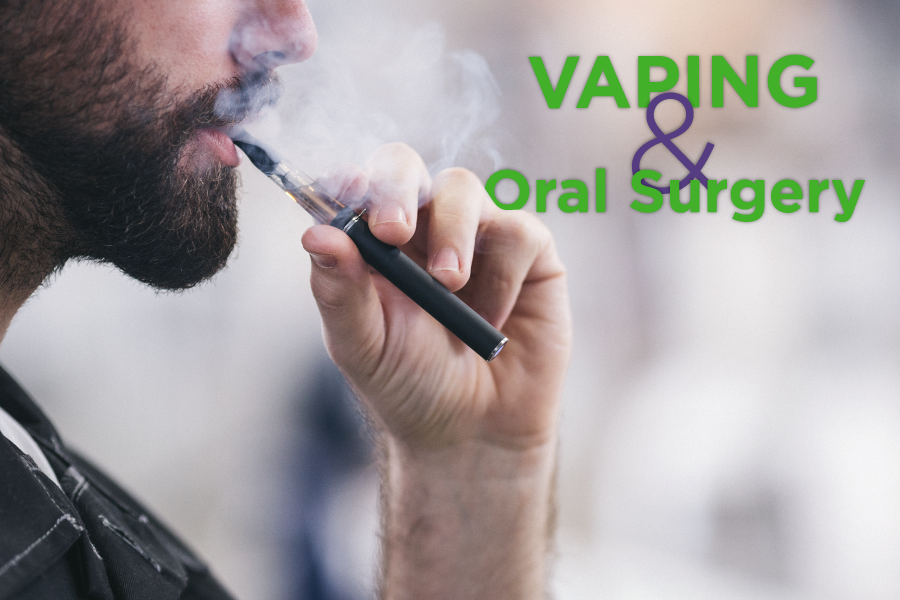Vaping and Dental Surgery
By Shelby Tatomir on July 9, 2019 in Dental Health

Preparing for dental surgery? For your smooth recovery, it’s critical that your dentist is aware of your habits and lifestyle. Using tobacco, vape pen, and e-cigarettes can make recovery and healing after dental surgery more difficult. Some think e-cigarettes are a safer alternative to smoking cigarettes. But, research suggests they could be even worse for your health than traditional cigarettes. In combination with dental surgery, e-cigarette and vape pen usage can be extremely harmful. Understand the risks by discussing with your dentist how to prepare for surgery as a smoker.
Nicotine and Dental Health
In 2017, 44 percent of individuals surveyed did not think e-cigarettes were harmful. Awareness around the negative health impact of vaping has been rising, but more information is needed. Vaping and e-cigarettes cause long-term problems for the mouth. Smoking makes you three times as likely to develop gum disease, and the nicotine in the substance also causes the breakdown of tissue in the mouth. Nicotine is a chemical found in tobacco and is also used in vape pens and e-cigarettes. This chemical is what makes smoking addictive.
Nicotine can make it harder for our body to repair. Not only does it damage the tissue in the mouth, but it also prevents wounds from healing like they normally would. The American Association of Nurse Anesthetists writes that vaping is no better than smoking when it comes to dental surgery. It increases the risks associated with anesthesia and can lead to other complications for surgery patients. Nicotine reduces the amount of oxygen that our vital organs and tissues receive. This makes the healing process and the surgery itself more dangerous. When oxygen isn’t circulating properly, it can increase your risk of developing an infection. For a variety of reasons, smoking after oral surgery will complicate recovery.
Being aware of the risks that vaping and e-cigarettes pose to dental surgery is only half the battle. Don’t be afraid to communicate with your dentists and health care providers about your use of e-cigarettes. Your dentist is more concerned about your safety during surgery than anything else.
Harmful Ingredients for Your Dental Health
“Propylene glycol” is the ingredient in vapes or e-cigarettes that carry the nicotine from the vape into the mouth. When inhaled, this ingredient breaks down into different acidic substances. These substances are very harmful to our teeth, enamel and soft tissue in your mouth.
Vegetable glycerin is used in medicine, personal care, and the food industry, and it’s also found in e-cigarettes and vaporizers. It’s mixed with flavorings when used in e-cigarettes and often called “e-liquid”. Studies show that the combination of these two substances makes bad bacteria four times as likely to stick to our teeth. The same study states that tooth enamel was weakened by 27% when we use flavored e-cigarettes versus unflavored. This substance allows more cavity-causing bacteria to stick to the teeth. Plus, these teeth are already softer from e-cigarettes use. This promotes uncontrollable tooth decay.
These are simply the substances in e-cigarettes and vaporizers that can harm your dental health. The batteries used for these products also add a great amount of risk, as they can overheat and explode.
Are E-Cigarettes and Vapes Safe?
The scientific research is still out about the long-term health impacts of vaping and e-cigarettes.
The products available on the market are made with different ingredients and hardware. They deliver vastly different amounts of nicotine and potentially toxic chemicals. This makes it difficult for public health officials to make a recommendation on usage.
Quitting smoking has immediate and long-term benefits. It can improve oral and overall health. Quitting it completely will give you a better chance at successfully stopping the habit for good.
For more information and help to quit vaping or smoking, call The American Cancer Society at 1-800-227-2345.